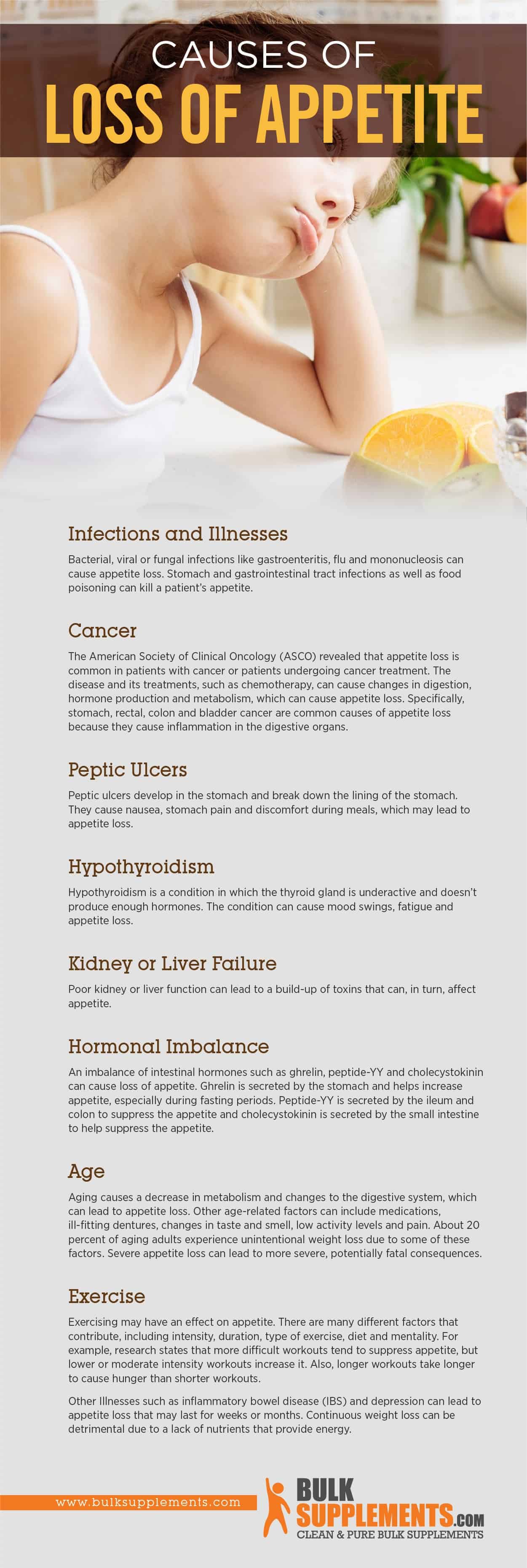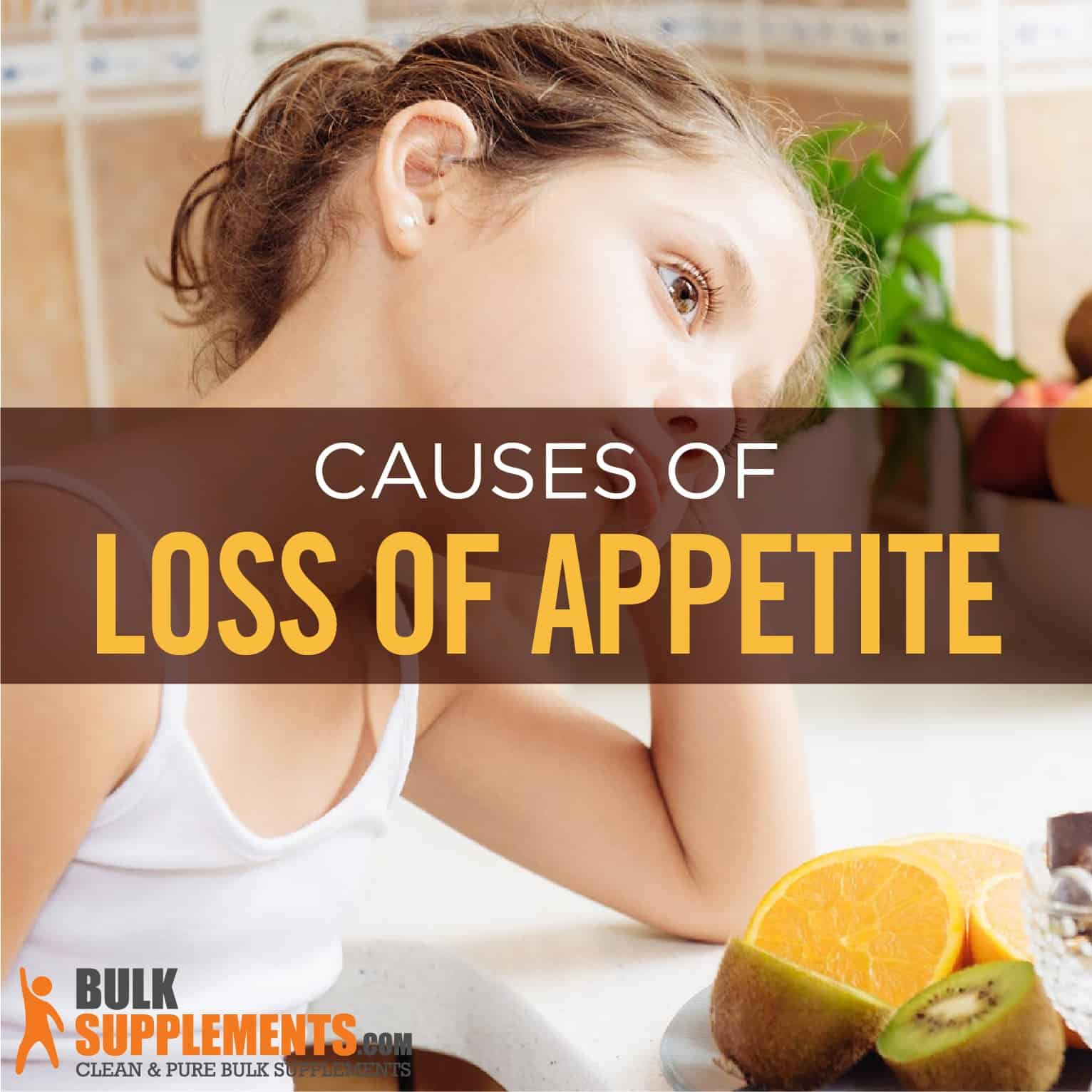You or someone you know may experience a loss of appetite. It’s when you lack the desire to eat, and in medical jargon, they call it anorexia. This type of anorexia refers to unintentional appetite loss, which is not the same as trying not to eat your food because of being intentionally concerned about weight gain.
Usually, loss of appetite stems from an identifiable condition. It may come from a variety of conditions, ranging from interaction with certain medications to more severe diseases. Most acute conditions trigger short-term appetite loss, but it can be a long-term symptom of some chronic diseases. Liver disease, heart failure, hormone disorders, metabolic problems, HIV, and COPD may cause patients to lose their appetites. Codeine antibiotics, morphine and chemotherapy medications may also trigger appetite loss. Pregnancy can also cause a loss of appetite. (X)
Causes and Risk Factors for Loss of Appetite
The central nervous system, endocrine system and digestive system communicate with each other in order to govern appetite regulation, which is a complex process. The hypothalamus is the head of the operation. A healthy, balanced appetite keeps the body in a homeostatic state, meaning the body gets sufficient energy and nutrients to maintain a healthy body weight. (x) (x) However, loss of appetite is a common problem and can occur for many reasons. (x)
- Infections and Illnesses
Bacterial, viral or fungal infections like gastroenteritis, flu and mononucleosis can cause appetite loss. Stomach and gastrointestinal tract infections, as well as food poisoning, can kill a patient’s appetite.
- Cancer
The American Society of Clinical Oncology (ASCO) revealed that appetite loss is common in patients with cancer or patients undergoing cancer treatment. The disease and its treatments, such as chemotherapy, can cause changes in digestion, hormone production and metabolism, which can cause appetite loss. (x) Specifically, stomach, rectal, colon and bladder cancer are common causes of appetite loss because they cause inflammation in the digestive organs. (x) (x)
- Peptic Ulcers
Peptic ulcers develop in the stomach and break down the lining of the stomach. They cause nausea, stomach pain and discomfort during meals, leading to appetite loss. (x)
- Hypothyroidism
Hypothyroidism is a condition in which the thyroid gland is underactive and doesn’t produce enough hormones. The condition can cause mood swings, fatigue and appetite loss. (x) (x)
- Kidney or Liver Failure
Poor kidney or liver function can lead to a build-up of toxins that can, in turn, affect appetite. (x) (x)
- Hormonal Imbalance
An imbalance of intestinal hormones such as ghrelin, PYY and cholecystokinin can cause loss of appetite. For example, the stomach secretes ghrelin, which helps increase appetite, especially during fasting periods. The ileum (third part of the small intestine) and colon secrete Peptide-YY (PYY) to suppress your need to eat. The small intestine secretes cholecystokinin to help stop the appetite. (x)
- Aging
Aging causes a decrease in metabolism and changes to the digestive system, leading to appetite loss. Other age-related factors can include:
- Medications.
- Ill-fitting dentures.
- Changes in taste and smell.
- Low activity levels and pain.
About 20 percent of aging adults experience unintentional weight loss because of some of these factors. Severe appetite loss can lead to more severe, potentially fatal consequences. (x)
- Exercise
Exercising may affect your appetite. Many different factors contribute, including intensity, duration, type of exercise, diet and mentality. For example, research states that more strenuous workouts suppress appetite, but lower or moderate-intensity workouts increase it. Also, longer workouts take longer to cause hunger than shorter workouts. (x)
Other Illnesses such as inflammatory bowel disease (IBS) and stress can lead to appetite loss that may last for weeks or months. Continuous weight loss can be detrimental because of a lack of nutrients that provide energy.
Symptoms Accompanying Loss of Appetite
Loss of appetite causes a lack of desire to eat, even if you have not eaten for an extended period, leading to unintentional weight loss. If it occurs temporarily because of an illness or emotional stress, the appetite usually returns after the sickness or stress passes, and there is no risk of significant weight loss. However, decreased appetite can cause other health problems. Some other signs to look out for that accompany the loss of appetite include: (x)
- Trouble focusing
- Water retention and swelling
- Insomnia
- Weakness and fatigue
- Constipation (x)
- Nausea, heartburn and bloating
- Low motivation and mood changes (x)
- Body aches and fever
- Reproductive difficulties
- Menstrual changes

Treatment for Loss of Appetite
Taking the natural route is the best approach for getting your appetite back. Talk with your healthcare provider about these treatments:
Medication
Depending on the severity of the symptom, certain medications may increase appetite. Megestrol helps regulate appetite but is also used to treat breast cancer. (x) Medications may cause side effects, so consult a doctor before taking any medication. Ideally, you increase your appetite through natural means, which is easy to accomplish.
Home Remedies
As mentioned earlier, taking a natural approach to increase your appetite is much better for your overall health. Some remedies include:
- Eat Green Vegetables
Green vegetables like collards, kale and spinach help increase digestive enzyme production and increase appetite. (x)
- Drink Plenty of Water
A loss of appetite can cause dehydration, so drink plenty of water to stay hydrated. If a slow digestive system causes a decreased appetite, increase water intake to help boost the digestive system. (x)
- Spices
Some spices, such as caraway and fennel extract, can boost the appetite, aid digestion and help combat recurring appetite loss. (x)
- Exercise
Exercise is vital for a healthy, functioning body and is an excellent appetite booster. You may lose your appetite during training, but it generally comes back after resting. For example, swimming is one of the best forms of exercise to boost the need to eat. (x)
Supplements for Digestion
Talk with your healthcare provider if you want to start a new supplement. The ones below may help with loss of appetite:
- Fish Oil
Fish oil contains fatty acids, an excellent natural supplement that affects mood, heals acne and improves heart health. In a research study, subjects who took fish oil supplements before breakfast experienced an increase in appetite. (x) Take one or two fish oil softgels two or three times every day or follow a physician’s instructions on dosage.
- Vitamin B1 (Thiamine)
Also called thiamine, vitamin B1 performs several different functions in the body, including boosting metabolism and reducing digestive problems. Folic acid and vitamin B1 are in poultry, green leaves and vegetables, so eating a healthy diet with thiamine supplements may help improve digestion and increase the appetite. Take vitamin B1 powder in 50 to 100 mg doses every day, unless a physician recommends otherwise.
- Zinc
Low zinc levels associate with gastrointestinal disease and help regulate hormones and metabolism. It also affects your appetite. (x) Foods that are high in zinc include cashew nuts, oysters, chicken and pumpkin seeds. The recommended dosage for zinc gluconate powder is between 225 and 450 mg per day unless a physician advises otherwise.
Where to Buy Supplements for Loss of Appetite?
You can purchase these supplements for loss of appetite at BulkSupplements.com. The company is an industry-leading manufacturer and distributor of pure dietary supplements.
BulkSupplements.com is not just a consumer brand. It also supplies pure ingredients to other food and supplement brands to make their products. All products at BulkSupplements.com are manufactured and tested according to current and proper manufacturing practices.
Are you interested in trying any of these powders or supplements mentioned in this article as a possible solution to helping you? Contact BulkSupplements.com to place an order today.
The Bottom Line
Anorexia is the medical term for loss of appetite. You no longer have the desire to eat. This type of anorexia refers to an unintentional loss of appetite, not the same as not eating to lose weight.
Appetite loss is a common symptom of various acute conditions, such as the flu or mononucleosis. It may also develop because of more chronic conditions, such as cancer, kidney disease or liver failure. It also often accompanies other symptoms, including insomnia, fatigue, constipation, bloating and nausea.
Medications can help boost appetites, but they have harmful side effects. Success happens with natural approaches. Patients can also use home remedies to increase their desire to eat — drinking plenty of water, exercising and eating green vegetables. Supplements may also aid digestive health, like zinc, vitamin B1 and fish oil. Although they may help, always consult a doctor before taking any supplement and follow their instructions.
These statements have not been evaluated by the Food and Drug Administration. These products are not intended to diagnose, treat, cure or prevent any disease.


